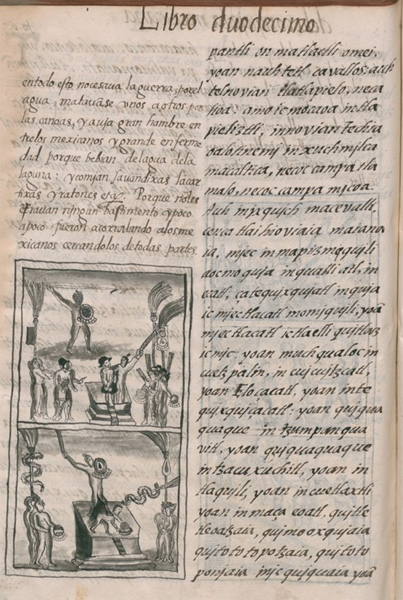Folio 67 verso
Translations and Transcriptions
Spanish Translation
[Translation of the Nahuatl into Spanish by Fr. Bernardino de Sahagún; transcription of the Spanish (left-hand column) by James Lockhart:] [f. 67v.] en todo esto no cesaua la guerra, por el agua matauāse vnos a otros por las canoas, y auia gran hambre entre los mexicanos y grande enfermedad porque bebian del agua de la laguna: y comian sauandixas lacartixas y ratones eta. Porque no les ētrauan ningun bastimento y poco a poco fueron acorralando a los mexicanos cercandolos de todas partes.
English Translation
[Translation of the Nahuatl (right-hand column) by James Lockhart:] they captured, along with four horses. Nevertheless, watch was kept everywhere, and there was fighting. They did not stop keeping watch because of [what had happened]. The people of Xochimilco went about in boats surrounding us on all sides; there were deaths and captives taken on both sides. And all the common people suffered greatly. There was famine; many died of hunger. They no longer drank good, pure water, but the water they drank was salty. Many people died of it, and because of it many got dysentery and died. Everything was eaten: lizards, swallows, maize straw, grass that grows on salt flats. And chewed at colorin wood, glue flowers, plaster, leather, and deerskin, which they roasted, baked, and toasted so that they could eat them, and [Translation of the Spanish (left-hand column) by James Lockhart:] In this whole time the battle did not cease on the water, those of each side killing the others in canoes. There was great hunger among the Mexica, and much sickness, because they drank water from the lake and ate vermin, lizards, mice, etc., because no supplies reached them. Bit by bit they went penning the Mexica in, surrounding them on all sides.
Analytic Transcription
[Transcription of the Nahuatl (right-hand column) by James Lockhart:] [f. 67v.] pantli onmatlactli omei, yoan nauhtetl cavallos: auh tel novian tlatlapielo, necalioa: amo ic mocaoa in tlapieliztli, in novian techiaoalotinemi in xuchmilca in acaltica, necoccampa tlamalo, necoccampa micoa. Auh in ixquich macevalli, cenca tlaihioviaia maianaia, miec in mapizmiquili aocmo quia in qualli atl, in ecatl, ça tequixquiatl in quia ic miec tlacatl momiquili, yoā miec tlacatl ic tlaelli quitlaz ic mic: yoan much qualoc in cuetzpalin, in cuicuitzcatl, yoan Eloçacatl, yoan in tequixquiçacatl: yoan quiquaquaque in tzumpanquavitl, yoan quiquaquaque in tzacuxuchitl, yoan in tlaquili,* yoan in cuetlaxtli yoan in maçaeoatl, quitletleoatzaia, quimooxquiaia quitototopotzaia, quitotoponiaia inic quiquaia yoā ---------- *TLAQUILI. Sahagún 1950-1982: 13.104, prefers "frilled flower," a medicinal herb. In either case, the word would end in "-lli" in the writer's normal practice.
Image

Spanish Translation
[Translation of the Nahuatl into Spanish by Fr. Bernardino de Sahagún; transcription of the Spanish (left-hand column) by James Lockhart:] [f. 67v.] en todo esto no cesaua la guerra, por el agua matauāse vnos a otros por las canoas, y auia gran hambre entre los mexicanos y grande enfermedad porque bebian del agua de la laguna: y comian sauandixas lacartixas y ratones eta. Porque no les ētrauan ningun bastimento y poco a poco fueron acorralando a los mexicanos cercandolos de todas partes.
English Translation
[Translation of the Nahuatl (right-hand column) by James Lockhart:] they captured, along with four horses. Nevertheless, watch was kept everywhere, and there was fighting. They did not stop keeping watch because of [what had happened]. The people of Xochimilco went about in boats surrounding us on all sides; there were deaths and captives taken on both sides. And all the common people suffered greatly. There was famine; many died of hunger. They no longer drank good, pure water, but the water they drank was salty. Many people died of it, and because of it many got dysentery and died. Everything was eaten: lizards, swallows, maize straw, grass that grows on salt flats. And chewed at colorin wood, glue flowers, plaster, leather, and deerskin, which they roasted, baked, and toasted so that they could eat them, and [Translation of the Spanish (left-hand column) by James Lockhart:] In this whole time the battle did not cease on the water, those of each side killing the others in canoes. There was great hunger among the Mexica, and much sickness, because they drank water from the lake and ate vermin, lizards, mice, etc., because no supplies reached them. Bit by bit they went penning the Mexica in, surrounding them on all sides.
Analytic Transcription
[Transcription of the Nahuatl (right-hand column) by James Lockhart:] [f. 67v.] pantli onmatlactli omei, yoan nauhtetl cavallos: auh tel novian tlatlapielo, necalioa: amo ic mocaoa in tlapieliztli, in novian techiaoalotinemi in xuchmilca in acaltica, necoccampa tlamalo, necoccampa micoa. Auh in ixquich macevalli, cenca tlaihioviaia maianaia, miec in mapizmiquili aocmo quia in qualli atl, in ecatl, ça tequixquiatl in quia ic miec tlacatl momiquili, yoā miec tlacatl ic tlaelli quitlaz ic mic: yoan much qualoc in cuetzpalin, in cuicuitzcatl, yoan Eloçacatl, yoan in tequixquiçacatl: yoan quiquaquaque in tzumpanquavitl, yoan quiquaquaque in tzacuxuchitl, yoan in tlaquili,* yoan in cuetlaxtli yoan in maçaeoatl, quitletleoatzaia, quimooxquiaia quitototopotzaia, quitotoponiaia inic quiquaia yoā ---------- *TLAQUILI. Sahagún 1950-1982: 13.104, prefers "frilled flower," a medicinal herb. In either case, the word would end in "-lli" in the writer's normal practice.
Image
